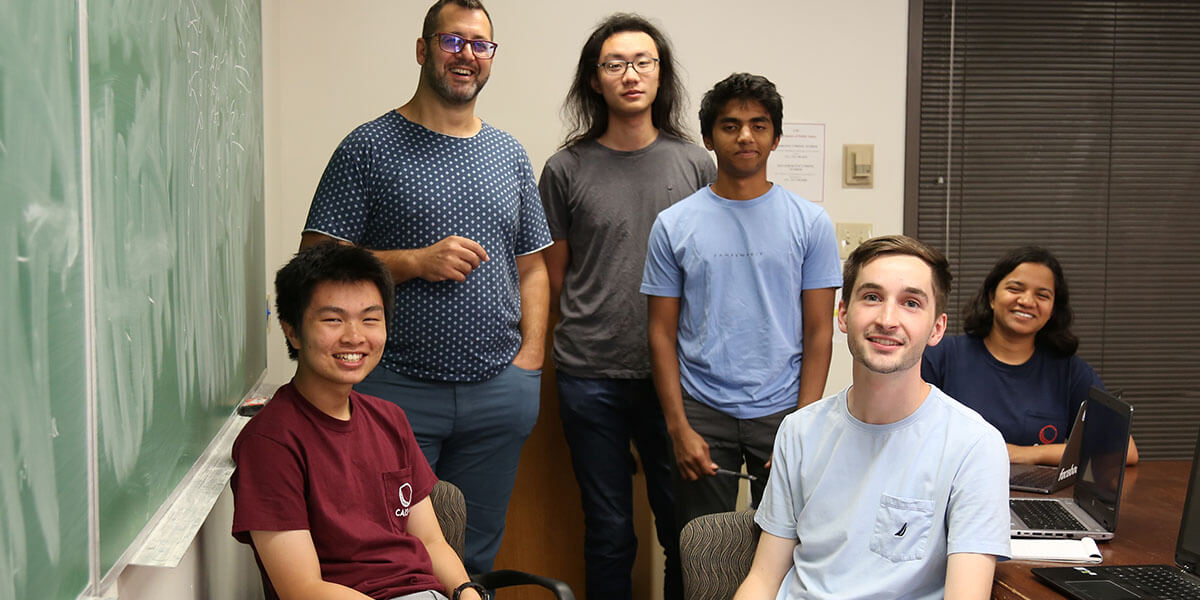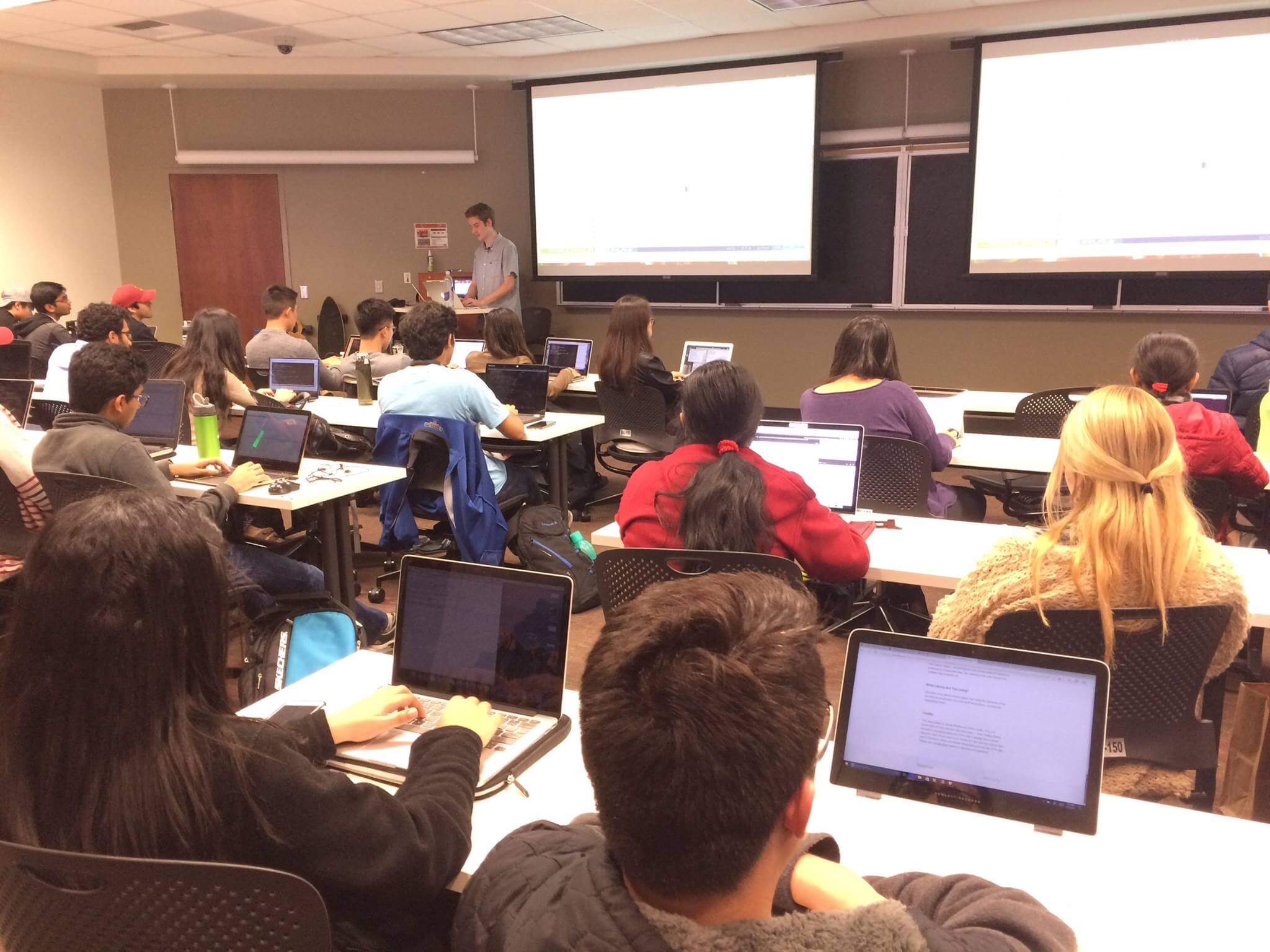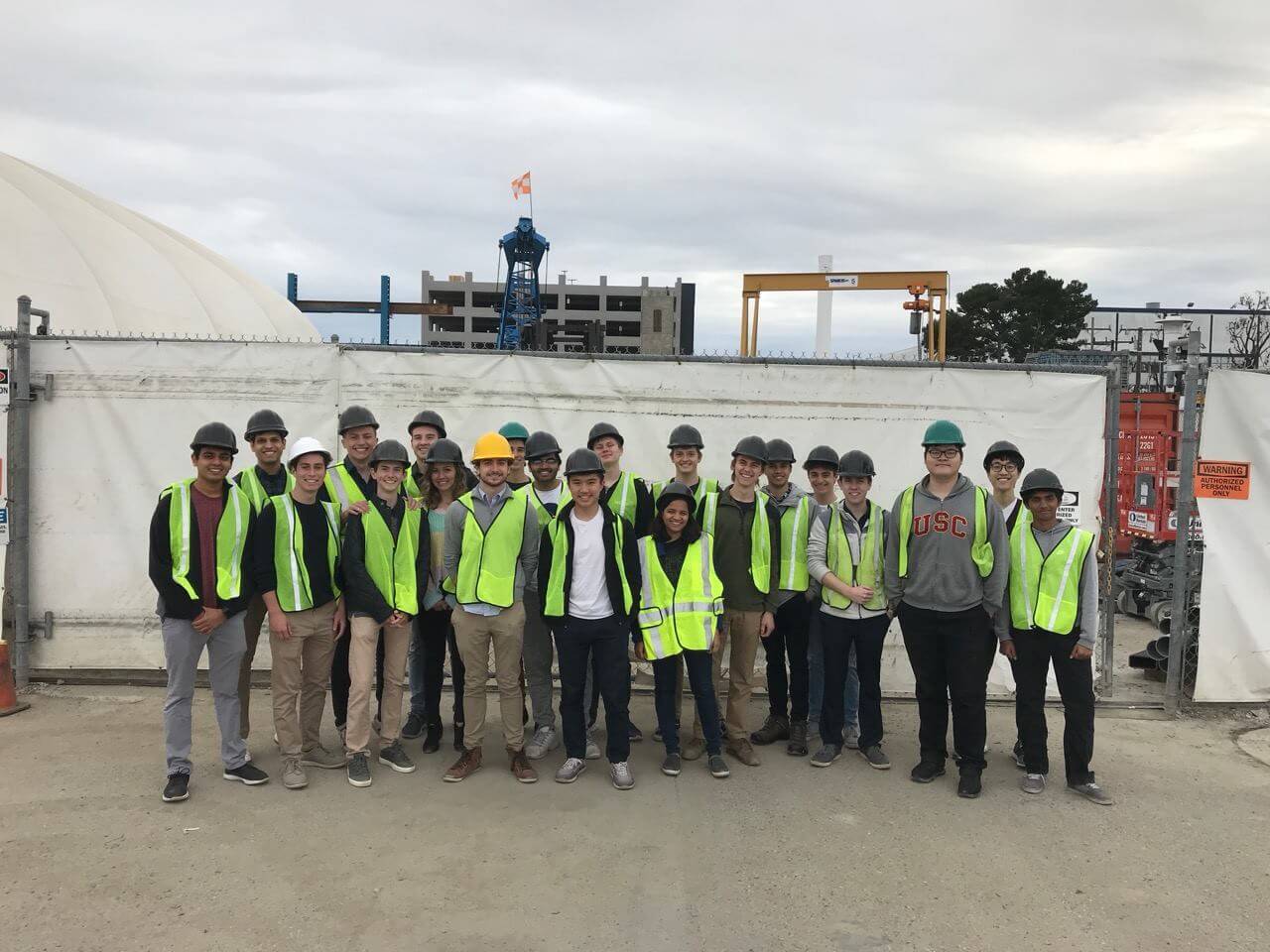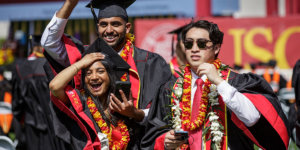
A team of CAIS++ students is working with USC linguistics professor Khalil Iskarous to efficiently transcribe endangered languages using AI techniques. They meet once a week on campus to discuss progress and ideas. (L-R: Eric Ye, Professor Khalil Iskarous, Jack Zhao, Tejas Ramdas, Zane Durante, Leena Mathur.) Photo/Haotian Mai.
From preserving and protecting endangered languages to helping doctors detect signs of lung cancer, USC students involved in CAIS++, the student branch of USC’s Center for AI in Society, are finding new ways to approach problems and improve people’s lives through artificial intelligence.

What started as a small group of eight freshmen IN 2016 is now a thriving club, with 50 active members. Photo/CAIS++ Facebook.
“Our belief is that AI can and should be used to solve society’s grand challenges, especially where traditional technology has fallen short,” said Head of Projects Leena Mathur, a computer science and cognitive science major in her junior year.
Mathur joined the club in her first semester and recently wrapped up a summer research internship in machine learning at the Ecole Polytechnique Federale de Lausanne in Switzerland. She says she probably wouldn’t have landed her dream internship without her experience in CAIS++.
“What really spoke to me was the sense of community we have as a club,” said Mathur.
“Everyone is so passionate about sharing their love for AI, and it makes us all more knowledgeable – it’s important to be surrounded by a community of people who support you.”
If you build it, they will come
Computer science senior Lucas Hu established CAIS++, the first student club of its kind in the country, during his freshman year in 2016, when he noticed many undergraduate students were interested in AI for social good. What started as a small group of eight freshmen from Hu’s dorm is now a thriving club, with 50 active members.

A CAIS++ machine learning workshop. Each semester, a new cohort walks through an introductory AI curriculum, complete with online lessons and in-person coding workshops. Photo/CAIS++ Facebook.
“People are so excited about their projects, they take the idea and run with it,” said Hu, who plans to join a “moonshot startup” after graduation, potentially focusing on using drones to deliver medical aid in Africa.
“It’s hugely rewarding to be part of a community that cares about lasting impact of technology and seeing people grow during their time with the club.”
The team meets once a week for student-led mini-tutorials based on the curriculum developed by the students in collaboration with faculty advisors. Each semester, a new cohort walks through an introductory AI curriculum, complete with online lessons and in-person coding workshops.
Preserving endangered languages
Members are able to choose projects that interest them. As a member, Hu’s team developed AI algorithms to detect signs of lung cancer in 3D scans, while Mathur is part of a team working with USC Dornsife linguistics Professor Khalil Iskarous to speed up the process of transcribing endangered languages. Experts say a fifth of humanity’s languages have fewer than 1,000 speakers, with one language going extinct about every two weeks.
“It’s hugely rewarding to be part of a community that cares about lasting impact of technology and seeing people grow during their time with the club.” Lucas Hu, CAIS++ founder.
The team, which has been working on the project since January 2019, is using partially labelled audio data in an endangered language called Ladin, mainly spoken in the Dolomite Mountains in Northern Italy, as training and test data. The ultimate goal is to develop a model that could be applied to any human language with limited changes.
“The CAIS++ students are some of the brightest student I have met,” said professor Iskarous, who meets with the team on a weekly basis.

CAIS++ students tour the Boring Company, Elon Musk’s infrastructure and tunnel construction company. Photo/CAIS++ Facebook.
“They’re brilliant and they bring very different skillsets to the table, from math to neuroscience to computer science and machine learning to linguistics and philosophy. I think working for the public good really motivates and inspires people and I’ve seen real evidence of that working with this team.”
Bistra Dilkina, a WiSE Gabilan Assistant Professor in computer science and CAIS associate director, developed her new undergraduate course, “Artificial Intelligence for Social Good,” this semester after speaking with members of CAIS++ leadership and realizing how much interest there was among USC undergraduates to learn about AI for social good.
“I have been impressed at the initiative, self-drive and passion for AI and social impact shown by the CAIS++ leadership and members,” said Dilkina.
“CAIS++ is an important student club because it raises awareness about the ability of AI to benefit some of the most pressing societal challenges among our undergraduate populations, hopefully inspiring them to learn AI and be good global citizens at the same time.”
Interdisciplinary effort
Diversity is a big focus for CAIS++. Currently, around half the club’s members are computer science majors, with other members focusing on electrical engineering, astronautical engineering, neuroscience and linguistics.
“My favorite thing about CAIS++ is the drive towards an interdisciplinary engineering effort,” said Lauren Potterat, a senior in astronautical engineering with a specialization in computer science who worked on a project to identify wildlife poachers using artificial intelligence.
“My favorite thing about CAIS++ is the drive towards an interdisciplinary engineering effort.” Lauren Potterat.
“The organization caters to, and was founded with the intent to unite a vast array of majors under a similar technical toolkit: artificial intelligence. In this way, business, finance, computer science, astronautics, social work and humanities bring a diverse mind and skillset in the pursuit of solutions to societal problems.”
This year, the club is partnering with the USC Sydney Harman Academy for Polymathic Study to run talks on the intersection between technology and humanity, especially with regards to the future of AI. Open workshops will also be on offer for those interested in learning some of the basics of machine learning.
“I am keen to reaffirm the positive potential of AI to students and the community,” said the club’s incoming president Benjamin Brooks.
“CAIS++ is about providing access to machine learning for those who might not have the opportunity to otherwise learn and apply their skills. We are working to build a more welcoming community for students who would otherwise be under-represented in the industry.”
Published on October 2nd, 2019
Last updated on May 14th, 2023











